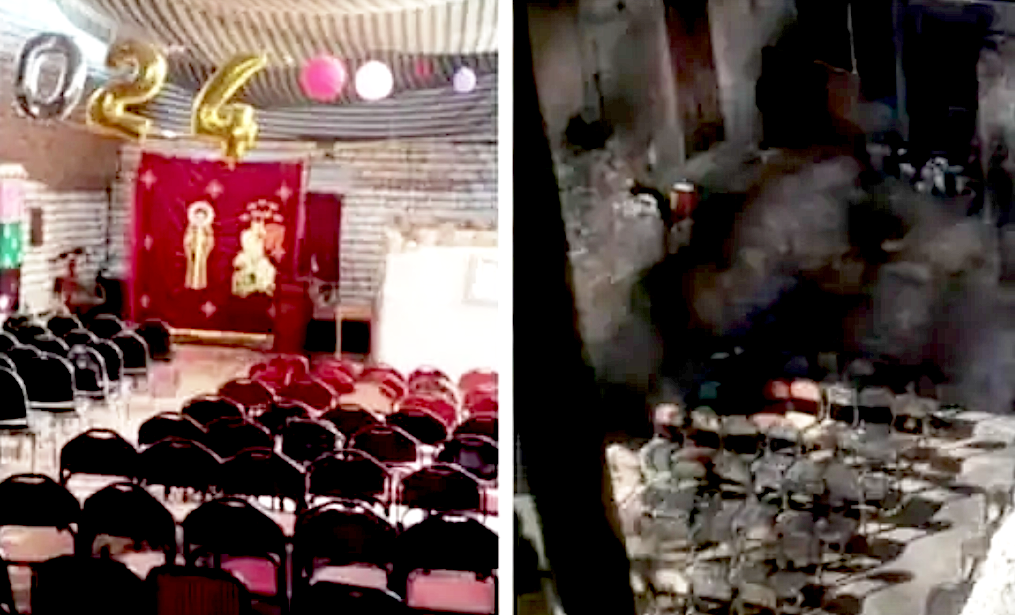By Raymond Ibrahim – Coptic Solidarity –
Sadly, but certainly not surprisingly, another Christmas has come and gone in Egypt, with yet another Islamic terror attack on a church gathered for prayer.
On Jan. 6, 2024—Christmas Eve according to the Orthodox calendar, which millions of Christians spend by worshipping in church—Muslim fanatics torched a prayer tent in the village of Mansheyet Zafarana in the Abu Qurqas district, Minya Governorate.
This was déjà vu. Exactly five years earlier, on Christmas Day, 2019, Muslim fanatics torched the actual church building that had once stood in that village. For this year, and after getting governmental approval, Coptic Christians set up a prayer tent with chairs inside, near where their torched church once stood, in an effort to celebrate Christmas of 2024.

Not ones to concede to such a small concession, Muslims have now torched that church tent as well. The before and after images of the inferno (above) are telling.
Coptic leader Bishop Philopater, Bishop of Abu Qurqas, issued a statement thanking God that there were no casualties in the fires. He hinted that Christmas celebrations in his diocese were to be restricted to religious rites, with no ceremonies, “in solidarity with” that village’s community.
According to the most recent reporting, there is no information of security services taking any measures following this attack.
After the original church building was burnt, the Coptic community in the village, and the diocese, applied through the official channels for a permit to rebuild it Five years later, however, the authorization has yet to be granted by the presidential commission that handles such matters in Egypt. Permission was only given by local authorities for the temporary tent—though that too is now gone.
This incident is hardly the first time that Islamists torch, not just churches, but church tents set up for holiday worship, both in Egypt and several other Muslim nations (as noted here).
Also, the church building that was torched on Christmas Day, 2019, in Mansheyet Zafarana, was only one of many that were attacked by Muslims or closed down by complicit authorities. What follows is a trip down memory lane, based on contemporary reporting of what was happening to Coptic churches in Egypt during Christmas of 2019:
An Islamic terror plot to bomb a packed Christian church on the evening of January 6, [2019] when Coptic Orthodox Christians celebrate Christmas, was foiled by police. According to one report, “[F]our explosive devices were planted around the Church of the Virgin Mary and St Mercurius in … Nasr City. Three were removed safely but the fourth, concealed in a bag, exploded when police bomb disposal technicians attempted to deactivate it. Police Major Mostafa Ebeid was killed in the blast, which wounded two other officers and a bystander. The explosion was the latest in a series of incidents apparently targeting Egypt’s Coptic Christian population, occurring the day before Orthodox Christmas eve….”
More generally, between late December and early January, authorities forcibly shut down four more churches in Egypt after angry Muslim mobs rioted to protest their existence. In one instance, on Friday, January 11, more than one thousand Muslims surrounded the St George Church in Minya and demanded its immediate closure. Not only did authorities comply, they evicted the two priests who were holed up inside the church and hauled them off in a vehicle used for garbage. The move prompted “an elated response from a jubilating, gloating mob,” along with triumphant cries of “Allahu Akbar!” (“Allah is greater!”)
Police “behaved with the priests as they would with killers,” one human rights lawyer said. “What happened frightened us,” added another clergyman. “I am a priest and it is possible for the police to cuff me if the extremist neighboring Muslims protest or gathered in front of my church. Things are getting worse, but let us pray to make God keep us in peace.”…
A January 15 report discussing this attack comments that, “In total, Egyptian authorities have closed four churches within the last four and a half weeks. No formal procedures against the attackers of these churches have begun.”





